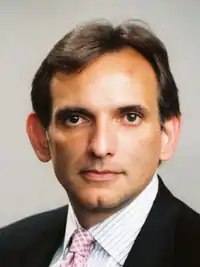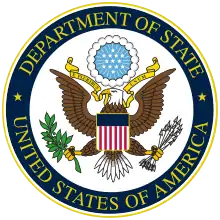Carlos Pascual (diplomat)
Carlos Pascual (born 1959) is a Cuban-American diplomat and the former U.S. Ambassador to Mexico and Ukraine.[1] He served at the U.S. Agency for international Development from 1983 to 1995, and at the White House National Security Council from 1995 to 2000, ultimately as senior director for Russia, Ukraine and Eurasia.[2] He was the State Department Coordinator for U.S. Assistance to Europe and Eurasia, and subsequently the Coordinator for Reconstruction and Stabilization from 2003 to 2005. Later he served at the Brookings institution[3] and was appointed Special Envoy and Coordinator for International Energy Affairs at the State Department's Bureau of Energy from 2011 to 2014.[4]
Carlos Pascual | |
|---|---|
 | |
| United States Ambassador to Mexico | |
| In office August 9, 2009 – March 19, 2011 | |
| President | Barack Obama |
| Preceded by | Tony Garza |
| Succeeded by | Earl Wayne |
| United States Ambassador to Ukraine | |
| In office October 22, 2000 – May 1, 2003 | |
| President | Bill Clinton George W. Bush |
| Preceded by | Steven Pifer |
| Succeeded by | John E. Herbst |
| Personal details | |
| Born | 1959 (age 61–62) Havana, Cuba |
| Political party | Democratic |
| Education | Stanford University (BA) Harvard University (MPP) |
He currently serves as senior vice president at IHS Markit.[5]
Education
Pascual attended Bishop Amat Memorial High School in La Puente, California, and graduated in 1976. He then earned a B.A. in international relations from Stanford University in 1980[6] and an M.P.P. from the Kennedy School of Government at Harvard University in 1982.[7] He was a student of Coit D. Blacker.[8]
Career
Pascual worked for USAID from 1983 to 1995 in Sudan, South Africa and Mozambique, and as Deputy Assistant Administrator for Europe and Eurasia. From July 1998 to January 2000, Pascual served as Special Assistant to the President and NSC Senior Director for Russia, Ukraine and Eurasia, and from 1995 to 1998 as Director for the same region, from October 2000 until May 2003, as the U.S. Ambassador to Ukraine.[9][10] When the Melnychenko recordings of Leonid Kuchma became known, Pascual revealed that the tapes are genuine, undistorted, unaltered, and not manipulated because of the conclusion from FBI Electronic Research Facility's analysis of the original recording device and the original recording found that there are not unusual sounds which would indicate a tampering of the recording, the recording is continuous with no breaks, and there is no manipulation of the digital files.[11][12] These recordings, known as Kuchmagate, confirmed Kuchma's involvement in the assassination by decapitation of Georgiy Gongadze and Kuchma's unwavering support for Vladimir Putin during the Cali cocaine cartel money laundering through the Putin-owned German firm St. Petersburg Real Estate Holding Company (German: St. Peterburg Immobilien und Beteiligungs AG) (SPAG).[13][14][15][16][lower-alpha 1] His support for the recordings' authenticity directly led to the Orange Revolution of 2004 in Ukraine.
He was then named Assistance Coordinator for Europe and Eurasia.[20] In 2004, he was named Coordinator for Reconstruction and Stabilization at the US Department of State.[21]
In 2015, Pascual worked as vice president and Director of the Foreign Policy Studies Program at the Brookings Institution[22] where he presided over the creation of the Brookings Doha Center and the Brookings-Tsinghua Center.
Selected by President Barack Obama as ambassador to Mexico, he was confirmed by the United States Senate on August 7, 2009.[10] He presented his credentials to the Mexican government on August 9, 2009[10] and personally to President Felipe Calderón on October 21, 2009.[23] Pascual submitted his resignation as Ambassador to Mexico on March 19, 2011 in part due to tensions with Calderón.[24] Tensions with President Calderón arose as a result of the WikiLeaks release of diplomatic cables in which Pascual criticized the Mexican military's ability or willingness to fight the Mexican drug cartels. Pascual is considered to be the first casualty of the Wikileaks affair.[25][26][27]
Pascual was appointed the State Department's Special Envoy and Coordinator for International Energy Affairs in May 2011, succeeding David L. Goldwyn.[28][29] He led the Bureau of Energy Resources.[30] Pascual was also the senior advisor to the Secretary of State on global energy diplomacy.[7] In February 2012, April 2013 and January 2014 Pascual was nominated as Assistant Secretary of State for Energy Resources, but not confirmed by the Senate.[31] In August 2014 Pascual was succeeded by Amos Hochstein.[32] After leaving the State Department Pascual became senior vice president of global energy at IHS Markit.[33][5]
Pascual serves on the Board of Directors of Centrica, a British multinational electricity and gas utility company.[34] He is a non-resident fellow at the Center on Global Energy Policy at Columbia University [7] and sits on the Atlantic Council Board of Directors.[35]
Publications
Pascuals publications include articles in The New York Times,[36][37] the Financial Times,[38] The Wallstreet Journal,[39] and HuffPost.[40] His book, Power and Responsibility, won a 2009 award for the best political science book published by an independent publisher.[41]
Notes
References
- "Perfil Carlos Pascual, de Stanford y de Harvard a México" (in Spanish). El Universal. Retrieved 2011-07-30.
- "Carlos Pascual Named Vice President and Director of Foreign Policy Studies at Brookings". Brookings. 2005-10-28. Retrieved 2018-05-12.
- "Carlos Pascual Named Vice President and Director of Foreign Policy Studies at Brookings". Brookings. 2005-10-28. Retrieved 2018-05-22.
- "Carlos Pascual - People - Department History - Office of the Historian". history.state.gov. Retrieved 2018-05-22.
- "Pascual, Carlos". ihsmarkit.com. Retrieved 2018-05-12.
- News, Stanford. "Greetings, Mr. President | The Dish". news.stanford.edu. Retrieved 2018-05-22.
- "Carlos Pascual". Columbia SIPA. 2018-02-02. Retrieved 2018-02-04.
- News, Stanford. "Greetings, Mr. President | The Dish". news.stanford.edu. Retrieved 2018-06-23.
- "Carlos Pascual". United States Department of State. Archived from the original on 2011-05-28. Retrieved 2011-07-30.
- "U.S. Ambassador to Mexico Carlos Pascual". United States Department of State, U.S. Embassy Mexico City. Archived from the original on June 9, 2011. Retrieved 2011-07-30.
- Pascual, Carlos (26 November 2002). "U.S. Ambassador's to Ukraine open letter to the editor of 2000 Newspaper". danskukrainsk.dk (Dansk-Ukrainsk Selskab). Retrieved 17 January 2020.
- Koshiw, J.V. (12–13 October 2007). "Kuchma's 'Parallel Cabinet' – The center of President Kuchma's authoritarian rule based on the Melnychenko recordings" (PDF). pp. 16–17. Archived from the original on 20 January 2012. Retrieved 17 January 2020.CS1 maint: bot: original URL status unknown (link)
- "Spuren in den Kreml? Die deutsche Immobilien-Firma SPAG soll der russischen Mafia als Geldwaschanlage gedient haben. Jetzt schlugen hiesige Ermittler erstmals zu. Das Netzwerk zieht sich bis nach Moskau" [Traces in the Kremlin? The German real estate company SPAG is said to have served the Russian mafia as a money-laundering system. Now local investigators struck for the first time. The network extends to Moscow.]. Der Spiegel (in German). June 2003. Archived from the original on 18 April 2016. Retrieved 16 January 2020.
- Hosenball, Mark (2 September 2001). "A Stain on Mister Clean". Newsweek. Archived from the original on 21 December 2013. Retrieved 16 January 2020.
- "Newsweek Details Putin's Alleged Organized Crime Ties…". Jamestown Foundation. 27 August 2001. Retrieved 16 January 2020.
- Milov, O.; Nemtsov, B.; Ryzhkov, V.; Shorina, O., eds. (2011). "Putin. Corruption. An independent white paper". putin-itogi.ru. Translated by Essel, Dave. Retrieved 16 January 2020.
- Belton, Catherine (7 October 2003). "New Book Poses Question of Putin's Links with Underworld". The St. Petersburg Times. Archived from the original on 30 September 2007. Retrieved 16 January 2020.
- J.V. Koshiw (12–13 October 2007). "Kuchma's 'Parallel Cabinet' – The center of President Kuchma's authoritarian rule based on the Melnychenko recordings" (PDF). pp. 17–20. Archived from the original on 20 January 2012. Retrieved 17 January 2020.CS1 maint: bot: original URL status unknown (link)
- Березовский, Борис (Berezovsky, Boris) (24 June 2003). "Новый передел. Что делать?" [New redistribution. What to do?]. Коммерсантъ (in Russian) (№129 (2732)). Archived from the original on 16 June 2011. Retrieved 16 January 2020.
- "U.S. Assistance to Europe and Eurasia". United States Department of State. Retrieved 2011-07-30.
- "Office of the Coordinator for Reconstruction and Stabilization". United States Department of State. Retrieved 2011-07-30.
- "Carlos Pascual Named Vice President and Director of Foreign Policy Studies at Brookings". Brookings. 2005-10-28. Retrieved 2018-02-04.
- "El narco es un problema serio: Pascual" (in Spanish). CNN Expansion. Retrieved 2011-07-30.
- "Ambassador Carlos Pascual". United States Department of State. Archived from the original on 2011-03-22. Retrieved 2011-07-30.
- "The Resignation of U.S. Ambassador Carlos Pascual". Center for Strategic & International Studies. Archived from the original on 2012-10-03. Retrieved 2011-07-30.
- "U.S. Ambassador to Mexico Resigns: Who is Carlos Pascual?". AllGov.com. Retrieved 2011-07-30.
- "Calderon: WikiLeaks caused severe damage to U.S.-Mexico relations". The Washington Post. 2011-03-04. Retrieved 2011-07-30.
- "Ambassador Carlos Pascual Appointed Special Envoy and Coordinator for International Energy Affairs". United States Department of State. Retrieved 2011-07-30.
- "Office of the Coordinator for International Energy Affairs". United States Department of State. Archived from the original on 2012-10-23. Retrieved 2011-07-30.
- "U.S. Hopes Boom in Natural Gas Can Curb Putin". Retrieved 2018-06-26.
- "Carlos Pascual". history.state.gov. Retrieved 2018-06-26.
- Harder, Amy (2014-07-25). "State Department Names Acting Energy Envoy". Wall Street Journal. ISSN 0099-9660. Retrieved 2018-06-26.
- Dickson, Rebecca (2015-05-07). "Iran courting US oil interests in secret talks". TheHill. Retrieved 2018-07-02.
- "Governance". Centrica. Retrieved October 23, 2015.
- "State Department Reform Report" (PDF). Atlantic Council. Retrieved 2018-06-23.
- Pascual, Carlos; Indyk, Martin (2006-08-22). "Opinion | In Lebanon, Even Peace Is a Battle". The New York Times. ISSN 0362-4331. Retrieved 2018-05-27.
- "Don't give up on Ukraine - Editorials & Commentary - International Herald Tribune". The New York Times. 2006-08-03. ISSN 0362-4331. Retrieved 2018-05-27.
- "Rights and wrongs of fixing Iraq". Financial Times. 2006-12-06. Retrieved 2018-05-27.
- "Sponsored Content: Carlos Pascual and William Burns discuss the Iran Nuclear Deal". CERA Connection. 2015-04-23. Retrieved 2018-05-27.
- Stedman, Bruce Jones, Carlos Pascual and Stephen (2009-04-16). "Changing How We Address Global And National Security". Huffington Post. Retrieved 2018-05-27.
- "Carlos Pascual | Columbia SIPA". sipa.columbia.edu. Retrieved 2018-05-27.
External links
| Diplomatic posts | ||
|---|---|---|
| Preceded by Tony Garza |
U.S. Ambassador to Mexico 2009–2011 |
Succeeded by Earl Wayne |
| Preceded by Steven Pifer |
U.S. Ambassador to Ukraine 2000–2003 |
Succeeded by John E. Herbst |
